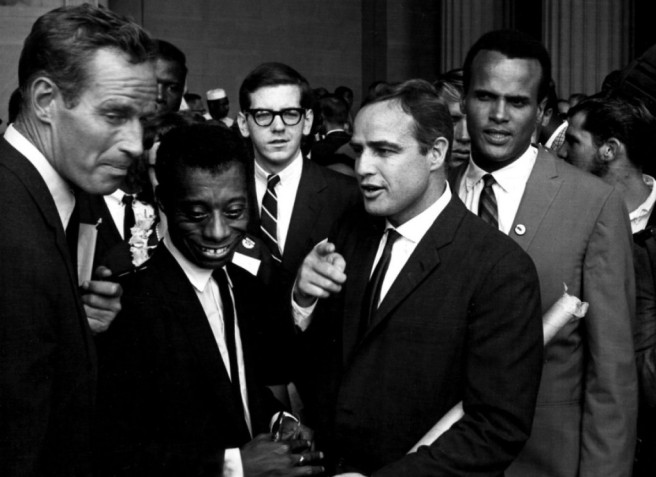
This is a movie conceived during the 1960’s that Director Raoul Peck (Lumumba, Sometimes in April) shows, in light of the state of Civil Rights in America today, is still, unfortunately all too relevant. This is like a refresher course in civil rights brought to the fore by the killings of black youths and the Black Lives Matter movement.
In 1979, James Baldwin wrote a letter to his literary agent describing his next project, “Remember This House.” The book was to be a revolutionary, personal account of the lives and successive assassinations of three of his close friends; Medgar Evers, Malcolm X and Martin Luther King, Jr. He died in 1987 without ever submitting a manuscript.
Peck was given the 30 pages Baldwin’s Sister, Gloria, found, who said, “You’ll know what to do with these.” Peck was shocked and said that for a project that never surfaced to include the most important people in the Civil Rights movement who were all assassinated, it just had to be produced, and he did.
The power of this documentary is how Peck weaves Baldwin’s writing combined with archival footage of him speaking including a riveting appearance on TV (Dick Cavett) and a speech at Cambridge. On the Cavett show, especially, you can feel how uncomfortable the host, his guests and maybe the audience is, as they listened to his indictment of race in America This is all wrapped in film clips following the lives of the three men central to the story; Medgar Evers, Malcolm X and Dr. Martin Luther King, Jr., and Baldwin’s interaction and mutual influence.



James Baldwin was a writer, commentator, and visionary educated in New York City. He left the United States to live in France in 1948 when Blacks were not being treated equally in the States. But when the Civil Rights movement fired up, he came back and was close with its leaders.
Samuel L. Jackson narrates, reading Baldwin’s words. Peck told him to make the words his own. Jackson said that was easy because he grew up in the South and knew what it was to leave your family and want to come back.
The film also includes passages from Baldwin’s The Devil Finds Work, written in 1976 and based on treatment of Blacks and Indians in Hollywood movies, starring Sidney Poitier, Gary Cooper and other popular actors. He says there were few, if any Minority actors in these movies, which is also a criticism that’s heard today as well.
Baldwin could speak to intellectuals, artists and street people and make something complex understood through his prose. His speeches and appearances shown in this film are not only impressive but riveting. He took command of the language choosing words carefully as if writing them out and he spoke pointedly to his audience whether they wanted to hear it or not. Baldwin always wore a suit coat and a narrow tie. His demeanor appeared passive but his eyes showed simmering emotion under the surface.
Director Peck describes Baldwin as “totally under known and under respected” in this country. In his novel “Go Tell it on the Mountain” and his essay book “The Fire Next Time,” the legendary writer proved himself one of the most insightful, passionate and articulate commentators of the Civil Rights era. What makes this film so remarkable, is the fact that it starts with just a 30-page outline that Peck has crafted into a mesmerizing, relevant and complete piece of art. It’s been 30 years since Baldwin died, but his words still ring true in this powerful film for a new generation. “Not everything faced can be changed, but nothing can be changed unless it is faced.”
Amazon Studios 95 Minutes PG-13



